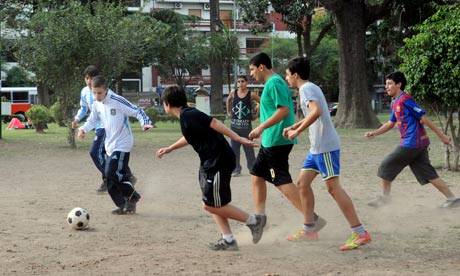Colaboré en este perfil de Bergoglio
Former colleagues and parishioners say disciplined and divine Jesuit will reform power structure, strictly control finances, and check Vatican pomp

Boys play football at Herminia Burana Square in Flores, where Jorge Bergoglio, now Pope Francis, used to play as a child Photograph: Grupo44/STR/LatinContent/Getty Images
The ascension of Pope Francis is likely to usher in the most radical change in the Catholic church in more than 50 years, claim those who know the Argentinian Jesuit from the barrio of Buenos Aires where he was born and cut his political teeth.
Zero tolerance of sexual abuse, stricter control of church finances, a shift away from Eurocentrism, more emphasis on poverty, and a ruthless purge of high-ranking opponents in the Vatican can be expected in the years ahead, according to priests and laymen who have spent decades watching the career of the first Latin American pope.
Jorge Bergoglio, as he was known until last week, was born to an Italian migrant family in 1957 in Flores, a down-to-earth and socially divided barrio just outside the centre of the Argentinian capital.
Domingo Bresci, a priest who studied with Bergoglio in the 50s and later worked with him in Flores, said the new pope was not a person to take half measures.
Holding up a copy of Fridays' La Nación newspaper with the headline "The Revolution of Francisco: Humility and Austerity", Bresci said the world should brace for a transformation of one of its oldest and most conservative religions.
"This headline is exactly right. He is going to have an impact on the world," said Bresci, who is now an adviser in the government's religious affairs bureau and a prominent figure in the leftist Liberation Theology movement. "He'll change the power structure of the church and challenge the ostentatious pomp of the Vatican."
At first sight, Flores is an unlikely place for a revolutionary. For the most part, this corner of Buenos Aires is unremarkably middle class.
Bergoglio was brought up in one of its swankiest neighbourhoods. His home 531 Membrillar Street – a leafy, tree-lined street of large, middle-class homes – is already becoming a site of pilgrimage for religious devotees.
"I've seen his work with the poor here for more than a decade," said Micheala Dobler, a 69-year-old resident who had come with her sister Olga to take pictures outside the pope's old home. "He is a divine man who has dedicated a great deal of his time to the poor."
From the pope's family home, it is less than five minutes drive to one of Argentina's poorest slums, or as they are known here the villas de emergencias (crisis communities).
In the triangle marked by the Flores Cemetary, a hospital filled every weekend with gunshot wound victims and the San Lorenzo Football Club (supported by the new pope), is a slum as grim as any in South America. The streets are filled with puddles, rubbish and abandoned cars. The graffiti on the walls includes football slogans, gang territory markings, as well as "Jesus" and "Revolution". The reputation is murderous.
"I would never drive here at night. It's too dangerous," said taxi driver, Angel Suarez. "My son was robbed near here last week. There are too many bandits and drug traffickers."
But while he was archbishop of Buenos Aires, Bergoglio doubled the number of priests in the slums.
One of them, Gustavo Carrara, of the Saint Mary, Mother of the People Church said locals were overjoyed that Bergoglio was chosen as pope.
"He understands the problems here ...Through his career he has always been close to the poor," said Carrara, who was ordained by Bergoglio. "He used to come and give mass and speak at ceremonies, such as the openings of the Home of Christ [a drug rehabilitation centre]."
As a Jesuit – an order founded by a general and organised on military lines – Bergoglio demands discipline. When he was made vicar general of Flores in 1992, he insisted that church authorities reveal the properties they owned. The senior padre in charge of episcopal finances, Jose Luis Mollaghan, tried to block the initiative. Bergoglio did not forgive or forget. When he became archbishop, he shuffled Molaghan out of his post, along with another cleric who opposed him, Hector Aguer.
Those who know him said Pope Francis is likely to do the same in the Vatican by clearing out the powerful old guard of cardinals, such as Tarcisco Bertoni and Angelo Sodano, who have been accused of dragging their feet over the church's finance and sexual abuse scandals, as well as his long-term Argentinian rival, Cardinal Leonardo Sandri.
"Slowly and strategically, he will introduce changes as he becomes more powerful and others become weaker. Until now, no pope has been able to do that," said Bresci, who predicts the transformation to be the biggest in half a century or more.
"He will be strict on finance. There will be zero tolerance of sexual abuse and homosexual liaisons by priests. This is his style. It comes from Flores."
Additional reporting: Sebastián Lacunza